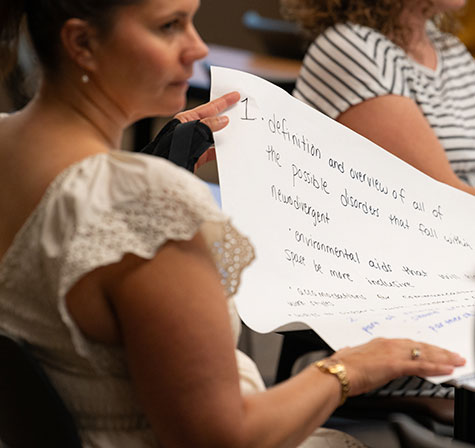Certificate in Neurodiversity for Educators & Professionals
Program Highlights | Curriculum | Faculty | How to Apply | Schedules
A Strengths-Based Approach for Success
Chico State's fully-online Certificate in Neurodiversity for Educators & Professionals is an interdisciplinary and data-driven program that blends practical strategies with reflective inquiry prioritizing student voice, educational justice, and the role of educators as advocates for systemic change.
 Participants will explore the concept of neurodiversity through a strengths-based and identity-affirming lens. Rather than focusing solely on diagnosis or remediation, the program emphasizes inclusive strategies that honor the diverse ways students think, learn, and engage with the world. It integrates current research from education, neuroscience, and disability studies to help educators create equitable and supportive environments where all students can thrive.
Participants will explore the concept of neurodiversity through a strengths-based and identity-affirming lens. Rather than focusing solely on diagnosis or remediation, the program emphasizes inclusive strategies that honor the diverse ways students think, learn, and engage with the world. It integrates current research from education, neuroscience, and disability studies to help educators create equitable and supportive environments where all students can thrive.
About the Certificate in Neurodiversity for Educators & Professionals
This micro-credential is designed for current and future education and clinical professionals who want to better support neurodivergent learners in inclusive, affirming, and evidence-based ways. Whether you're a classroom teacher, special education professional, speech pathologist, occupational therapist, teaching assistant, counselor, or paraprofessional, this program offers accessible, high-impact training—no prior experience with neurodiversity required.
- The eight-month, non-credit program begins March 9, 2026.
An accelerated, two-month summer program is also available. - The program consists of six courses: three core courses, your choice of two electives, and a capstone practicum or applied project.
- Courses are fully-online, asynchronous with self-paced coursework. There will be optional opportunities to engage with instructors and other learners through office hours, chat rooms, and collaborative time.
- Fees are $400 per course and are paid for each course at the time of registration. The total to complete the entire six-course program is $2,400. *
- Educators may purchase professional development credits for $85/per one-unit course to apply toward salary steps.
Faculty
 Dr. Josie Blagrave is a professor in the Department of Kinesiology at Chico State and a co-founder of the Neurodiversity & Disability Symposium. For over 15 years, she has served as the director of the Autism Clinic at Chico State, championing inclusive practices and support for disabled students across the campus and the California State University system. Dr. Blagrave’s research focuses on amplifying autistic voices, enhancing health outcomes for autistic individuals and their families, and fostering acceptance, belonging, and improved supports in educational and physical activity settings.
Dr. Josie Blagrave is a professor in the Department of Kinesiology at Chico State and a co-founder of the Neurodiversity & Disability Symposium. For over 15 years, she has served as the director of the Autism Clinic at Chico State, championing inclusive practices and support for disabled students across the campus and the California State University system. Dr. Blagrave’s research focuses on amplifying autistic voices, enhancing health outcomes for autistic individuals and their families, and fostering acceptance, belonging, and improved supports in educational and physical activity settings.
 Tal Slemrod is an associate professor and coordinator for the educational technology and distance learning program through Chico State's School of Education. His 2022 Outstanding Professor award highlights his focus on creating a better world and more equitable schools for underserved children and their teachers.
Tal Slemrod is an associate professor and coordinator for the educational technology and distance learning program through Chico State's School of Education. His 2022 Outstanding Professor award highlights his focus on creating a better world and more equitable schools for underserved children and their teachers.
 Shannon Slemrod is a Licensed Professional Clinical Counselor working in Chico State's WellCat Counseling Center. She holds an MA in Counseling Psychology and her clinical interests include neurodiversity and mental health management.
Shannon Slemrod is a Licensed Professional Clinical Counselor working in Chico State's WellCat Counseling Center. She holds an MA in Counseling Psychology and her clinical interests include neurodiversity and mental health management.
Curriculum
Courses are designed to be flexible, relevant, and immediately applicable—empowering educators and professionals alike to transform their classrooms and institutions into places where neurodivergent learners are not only included, but truly valued. You can expect to spend approximately 15 hours per course on assignments and activities, plus additional time for reading, reflection, and/or research.
Learning Outcomes:
- Confidently support neurodivergent learners using inclusive, evidence-based, and strengths-focused practices tailored to diverse settings.
- Create accessible curriculum and learning environments that integrate evidence base practices, assistive technology, and trauma-informed approaches.
- Promote equity and belonging by addressing systemic barriers, bias, and stigma through culturally responsive teaching and collaborative partnerships.
- Demonstrate leadership in inclusive education by designing and implementing a real-world project that advances neurodiversity-affirming practices in your classroom, program, institution or clinical setting.
Core Courses
Introduction to Neurodiversity in School-Based and Clinical Settings
This course introduces learners to the concept of neurodiversity and its implications in education and clinical settings. You will explore the history of neurodiversity, common neurotypes (e.g., autism, ADHD, dyslexia, dyspraxia), and the impact of strengths-based versus deficit-based approaches. [Read full description]
Engaging and Supporting Neurodiverse Learners Across Contexts
Learn foundational knowledge and practical strategies to support neurodiverse learners across K-12 educational and clinical settings. You will explore developmental considerations across different age groups, social-emotional and academic support strategies, and key transition planning processes. [Read full description]
 Evidence-based Practices in Neurodiversity for Educators and Professionals
Evidence-based Practices in Neurodiversity for Educators and Professionals
Through an introduction to evidence-based practices (EBPs) that support neurodivergent learners in education and clinical settings, you will explore the foundations of neurodiversity, review current research, and examine practical strategies that promote learning, inclusion, and self-advocacy. [Read full description]
Electives (Choose Two)
Culturally Responsive and Trauma-Informed Teaching for Neurodivergent Individuals
This course focuses on the intersection of neurodiversity, culture, and trauma in educational settings. You will explore how systemic bias, stigma, and unrecognized trauma impact neurodivergent learners and their educational experiences. [Read full description]
Assistive Technology and Digital Accessibility for Neurodivergent Populations
This course equips professionals with the knowledge and skills to integrate assistive technologies and accessible digital tools that support neurodivergent learners. Explore a range of technology solutions and examine how digital content and assessments can be designed to reduce barriers and enhance learning. [Read full description]
Communication, Collaboration, and Self-Advocacy for Educators and Professionals
This course centers on the importance of effective communication and collaboration in supporting neurodivergent learners. You will explore strategies for building strong partnerships with families, support staff, and administrators, while also fostering environments where students are empowered to express their needs and advocate for themselves. [Read full description]
Capstone:
Applied Project or Practicum in Neurodiverse Education
Apply your learning through a real-world project or practicum focused on inclusive and neurodiversity-affirming education. Design and implement a project—such as a curriculum module, accessibility audit, or instructional strategy—in your own professional setting or in collaboration with a learning community. [Read full description]
Apply Today!
There are no prerequisites for this program and the application is free. You'll simply need to provide basic information about yourself and your current role as an educator or professional supporting neurodivergent students.
* Federal loans, financial aid, or the CSU employee fee waivers are not available for this program. Other options, such as loans, may be available.


